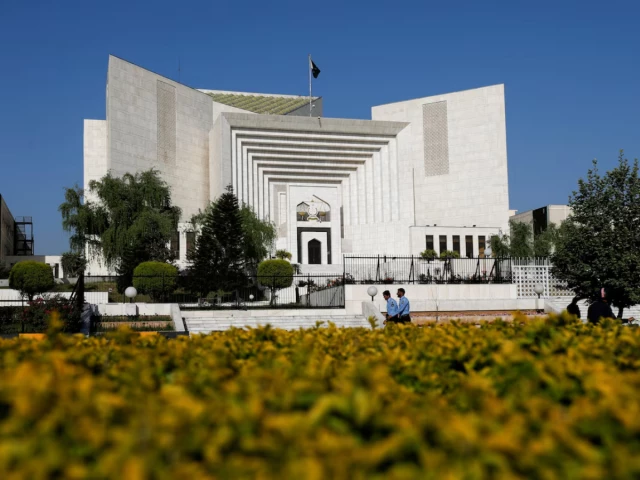Judiciary in spotlight as govt readies constitutional bill
SC is likely to be converted into an appellate court through upcoming tweaks

As the federal government is likely to table the 27th Constitution Amendment Bill in parliament today (Friday), all eyes are on the Supreme Court judges and their response to the proposed creation of the Federal Constitutional Court (FCC), which would serve as the country's apex court.
The Supreme Court is likely to be converted into an appellate court through the 27th constitutional amendment.
It is learnt that the government is considering allocating the premises of the Federal Shariat Court (FSC) to either the FCC or the existing Supreme Court.
Sources revealed to The Express Tribune that a senior federal minister visited the FSC premises on Wednesday night for inspection. Later, a delegation of FSC judges approached the Supreme Court on Thursday to express their concerns over the government's plan to relocate the Shariat Court.
It is an open secret that the 26th and 27th Constitutional Amendments could not have been introduced without the facilitation of a certain section of the judiciary.
Former chief justice Qazi Faez Isa, along with his "like-minded judges", had facilitated the 26th Constitutional Amendment through judicial orders. After his retirement, there was hope that Chief Justice Yahya Afridi would restore the independence of the judiciary. However, things deteriorated after he assumed office.
Since the 26th Amendment, the Supreme Court has been divided into two camps.
The judges who benefited from the 26th Constitutional Amendment are expected to be accommodated again through various means. The government is reportedly satisfied with their performance over the past year.
The Constitutional Bench formed under the 26th Amendment had endorsed the trial of civilians in military courts and also overturned the Supreme Court's earlier judgment that declared the PTI entitled to reserved seats.
Following that order, 78 reserved seats in the national and provincial assemblies were allocated to the ruling political parties. As a result of the Supreme Court's decision, the government now holds a two-thirds majority in the National Assembly. The Constitutional Bench has not questioned any executive action over the past year.
On the other hand, the judges who were adversely affected by that amendment are likely to be superseded again, as they are not in the good books of the present regime.
The Constitutional Bench has not decided the petitions challenging the 26th Constitutional Amendment for the past year.
It will now be interesting to see whether the Constitutional Bench takes up the petitions challenging the 26th Constitutional Amendment on November 10. Some members of the bench are currently abroad and are expected to return this weekend.
If the Constitutional Bench does not take up the petitions next week, the 26th Constitutional Amendment case may become infructuous following the passage of the 27th amendment.
Lawyers believe that the role of Chief Justice Yahya Afridi and three members of the Constitutional Bench — Justice Aminuddin Khan, Justice Jamal Khan Mandokhail, and Justice Muhammad Ali Mazhar — will be crucial in the next 10 days.
They say that once the bill is tabled in parliament, the bench should ask the Attorney General for Pakistan to present the draft for examination.
Barrister Asad Rahim Khan said that history would not forgive any judge who trades the sanctity of the Supreme Court for a wretched chair on a federal bench, nor for destroying Pakistan's common law tradition in exchange for a handful of peanuts in a meaningless "constitutional" court.
"This is a time to act. Either our superior judiciary accepts the terms of its own confinement - which will be ensured by the 27th amendment on the heels of the 26th - or the judges can strive to preserve the independence their institution has fought for, brick by painful brick, since 2007 and, by another measure, 1996. May they find the courage not to become complicit in their own humiliation," Barrister Khan said.
Former additional attorney general Tariq Mahmood Khokhar said that the enactment of the 27th Constitutional amendment is imminent. "It will render the petitions against the 26th Amendment infructuous."
He stated that a few independent judges alone cannot ensure a full court hearing or the expeditious disposal of cases. The majority, including the chief justice, are not inclined to move in either direction for their own personal reasons.
"The consequence will be an almost complete rupture of the existing constitutional order and the creation of a praetorian constitutional court," he added.
Khokhar said the executive would tighten its grip on the judiciary, rendering the office of the chief justice increasingly symbolic.
"The Constitution is ultimately what they choose to make of it. No one can genuinely claim ignorance of the unrepresentative nature of the country's legislature. It is high time the judiciary - or at least a part of it - denounced its own rollbacks," he added.
Khokhar stated that the time is ripe to resign on principle and in good conscience. There are precedents, though not many, when relinquishing judicial office was considered the more honourable course, he added.
Rida Hosain Advocate said the judiciary's inaction over the 26th Amendment has emboldened the government to tighten its control over the courts.
She noted that the core challenge to the amendment lies in its subordination of the judiciary to executive influence. Had the Supreme Court decided the petitions against it, she added, the situation today would have been vastly different. "Instead, the failure to do so has paved the way for the 27th amendment."
She observed that judges who have spoken up for judicial independence, or against the delay in hearing the petitions, remain in the minority.
She added that Chief Justice Yahya Afridi has sent a clear message to the government that challenges to executive-backed amendments will linger unresolved for over a year.
Rida further stated that had the voices defending judicial independence prevailed, the executive would not have felt so confident in dismantling what remains of it. Regrettably, she added, those resisting executive influence are a small minority - allowing the government to act without fear of consequences.
'Only constituent assembly can amend Constitution'
Renowned lawyer Akram Sheikh said that for parliament to amend the Constitution, it must possess constituent power - a power delegated by the political sovereign to their representatives for that purpose.
Sheikh stated that the 2007 general elections were actually held on February 18, 2008, due to the tragic assassination of Mohtarma Benazir Bhutto.
"The amendments were made after ten months of deliberation by a parliamentary committee headed by Mian Raza Rabbani, who was then the chairman of the Senate," he said.
"Although the 18th Constitutional Amendment was challenged, inter alia, on the basic grounds of violating the independence of the judiciary and being procedurally ultra vires," he added.
"This time, there is no renewed constituent power to table such an amendment, which makes the move ultra vires of this basic sovereign attribute. Therefore, parliament must refrain from acting contrary to the Constitution, which they have sworn to defend and protect before assuming office."




















COMMENTS (1)
Comments are moderated and generally will be posted if they are on-topic and not abusive.
For more information, please see our Comments FAQ